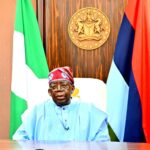The Lagos State Governor, Babajide Sanwo-Olu, has announced the disbursement of ₦2.7 billion under its EKO Cares and EKO Listens social intervention programmes, reaching over 10,000 vulnerable households across the state.
Sanwo-Olu, who reaffirmed his administration’s commitment to poverty reduction and inclusive development, said the initiative aims to provide financial support for residents in areas such as healthcare, housing, education, and small business growth—regardless of ethnicity, gender, or political affiliation.
The governor, who made the announcement while speaking at the presentation of ₦460 million in cheques to 1,000 new beneficiaries of the EKO Listens programme, held at the LTV premises, Agidingbi, Ikeja, said the gesture reflected the essence of governance rooted in empathy and inclusion.
Sanwo-Olu, represented at the presentation by the Deputy Governor, Dr. Obafemi Hamzat, said, “This presentation is not just a ceremony; it is a celebration of compassion and our shared humanity,” he said. “Progress is not only about infrastructure or numbers, but about how deeply we care for one another. Through initiatives like this, we strengthen the bond of trust between government and citizens.”
The Governor disclosed that so far, EKO Cares has supported over 8,100 individuals, while EKO Listens has assisted more than 8,690 residents. In 2024 alone, ₦1.1 billion was distributed to 2,477 beneficiaries, with an additional ₦1.6 billion earmarked to support another 2,850 residents before year-end.
Sanwo-Olu praised President Bola Ahmed Tinubu for initiating bold national reforms, describing them as the foundation for sustainable prosperity and economic inclusivity. He urged Lagosians to remain patient and supportive of the President’s Renewed Hope Agenda.
The Special Adviser on Political, Legislative and Civic Engagement, Dr. Afolabi Tajudeen, earlier in his own remark, said the financial assistance programme aligns with the T.H.E.M.E.S Plus Agenda and demonstrates the government’s commitment to equity and empowerment.
According to Tajudeen, beficiaries were carefully selected from about 5,000 applicants across all 20 Local Government Areas and 37 Local Council Development Areas, with women making up 46 percent of the recipients.
He added that the governor had also distributed food palliatives to over 2,000 vulnerable residents, including the elderly and persons with disabilities.










